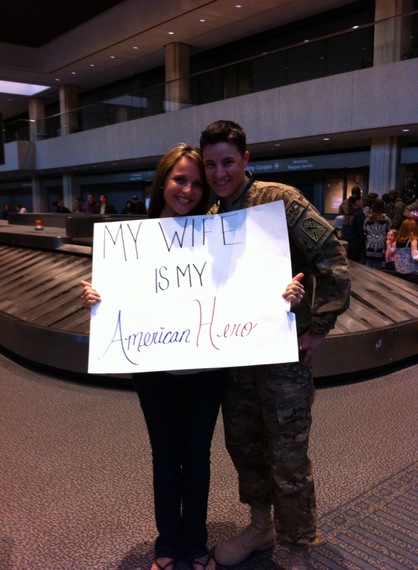
I've written before about my experience serving in the pre-DADT military, and the status of lesbian and gay service members has continued to be cause near and dear to my heart. In the days before and during DADT, the military was a less than welcoming place for LGBT service members. Those who served lived with the constant fear of "outing" and investigation, arrest, courts martial and sometimes even physical attack. In every case, discovery meant certain expulsion from the military, regardless of one's record of service or ability, and the less than honorable discharge would become a proverbial scarlet letter, affecting employment and one's standing in the community forever.
For those who remained in the military, the ever-present fear kept them firmly entrenched in the closet, unable to speak openly or acknowledge their own families in public. I wrote a short story a few years back about a lesbian soldier whose partner endured the indignities of military send-offs and welcome home ceremonies that never allowed for the emotional connections or public displays of affection afforded to their straight counterparts. One didn't risk a kiss or tender touch, let alone expect to be treated with the same dignity as other military spouses upon your wife or husband's death. That was just the way it was.
Then history shifted. DADT was repealed in 2011, but standing federal law still prevented recognition of LGBT patriots' families. Just before DOMA fell in 2013, I received a letter from an Army National Guard Sergeant, who had read my first novel about a lesbian serving in the military. AJ had already completed a tour of duty in Iraq, and was preparing for yet another deployment to Afghanistan with her unit. We struck up an email correspondence in the ensuing months, comparing notes on the military's progress and the progress still needed. She shared her fears that her family wouldn't be taken care of should something happen to her, because marriage still hadn't been possible prior to her deployment. It angered and saddened me to hear her story, knowing there were so many others like AJ, serving our country in the midst of a war zone, yet still unable to quite find that elusive security for their families.
DOMA was struck down while AJ was deployed. Soon afterward, policies were revised that would protect military families. More states repealed their laws to either allow same-sex marriage or to recognize same-sex marriages performed in other states. Last month, Virginia became the latest state to recognize other state's marriages. Virginia. That just happens to be AJ's home state. Her Guard Unit hails from the Commonwealth of Virginia and they were leaving Afghanistan any day. The symbolism was something I couldn't ignore. Sometimes fate is pretty cool. But expressions of love are profound.
Last Saturday, AJ's company arrived home in Virginia to the cheers of their loved ones. Facebook was flooded with joyous and loving pictures of many reunions, with one that stuck out like a beacon in the night. In the crowd stood a woman proudly holding up a large hand-made sign that said: "My wife is MY American Hero." She stood there among the other wives and husbands without fear or reservation of any kind because this was her right, to stand there beaming with pride, awaiting her soldier. Her wife. The image and its significance brought tears to my eyes. Catie's one simple act of love and devotion. A brilliant testament to a victory finally won.
The march of equality moves on. Welcome home to all our American Heroes.
Indeed.
Peace ~ LM
